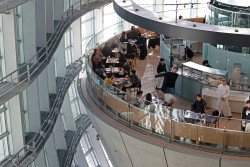
March 25, 2015
Small Print: March 25, 2015
Toilet madness, scootered bandits, miracle trees, and more ...
We have considerable success at reviving images of precious memories that people have given up on reproducing”
—Takahiko Koyama, president of Retro Enterprises in Sumida-ku, which specializes in refurbishing black-and-white television sets
THANKS BUT NO THANKS
- A group of NPOs and other organizations involved in reconstruction in northeastern Japan have designated 53 disaster-hit locations as “pilgrimage sites.” Among the destinations are two reactors at the crippled Fukushima nuclear plant and the so-called miracle pine tree of Rikuzentakata.
- Officials in Okinawa have come up with a plan to get rid of an invasive species of wasp that’s been devastating local trees … by introducing another type of wasp that preys on the interlopers.
- Immigration authorities suspect a Philippine diplomat helped three of his countrymen enter Japan to work at jobs in violation of their visa status.
MILESTONES
- On February 12, The Mainichi Shimbun published its 50,000th issue.
- Self-Defense Force officials say they’ve fulfilled the terms of a 2008 treaty by disposing of all of Japan’s cluster munitions.
- Scholars say a recently discovered trove of 400 notebooks and other papers written by celebrated military commander Gentaro Kodama (1852-1906) represents “a boon for modern history research.”
- A tasting event in Toyama featured a squid believed to be among the largest ever captured. The beast measured six meters long and weighed 130 kilos.
85
|
50
|
52
|
FROM THE BUSINESS DESK
- Didier Leroy, a 57-year-old Frenchman, became the first non-Japanese to be named an executive vice president at Toyota Motor Co.
- Executives at Sumitomo Mitsui Trust Bank unveiled a plan to welcome back retired workers who “have specialist knowledge of inheritance, real estate, and other areas.”
- Members of an education ministry panel have urged the government to boost the salaries of senior researchers and increase support for younger scientists.
- Doctors with the Japan Society of Obstetrics and Gynecology approved a research study to determine whether improved screening of eggs fertilized in vitro can reduce miscarriage rates.
SPANNING THE GLOBE
- Dozens of primary and middle school students in Osaka are flocking to a community center that’s been repurposed as an “English village.” The goal is to immerse the kids in an international environment.
- U.S. actress Charlotte Kate Fox, who co-starred in the hit NHK drama Massan, has been chosen to play the lead role in a Broadway production of Chicago.
- Officials at the University of Tokyo and Peking University announced a plan to enhance academic and student exchanges.
- Headline of the Week: “Chinese Scrambling to Buy Shower Toilet Seats in Japan” (via The Japan News)
GAME ON!
- Tokyo Governor Yoichi Masuzoe said he believes funds earmarked for disaster reconstruction in Tohoku would be better used to help pay for the 2020 Olympics. Which is weird, because last year Masuzoe went on record as saying the reconstruction budget should be used for disaster recovery and that the “cost of hosting the Olympics can be covered from elsewhere.”
- Officials at JR East said they’ll introduce double-decker “green car” carriages on the Chūō and Ōme Lines in time for the Tokyo Games.
- Bottom Story of the Week: “Mystery Person Who Sent Hina Dolls to U.S. President Kennedy Identified” (via Mainichi Japan)
Compiled from reports by AP, Japan Today, The Japan Times, Jiji, The Tokyo Reporter, The Mainichi, The Japan News, AFP, Reuters and Kyodo







